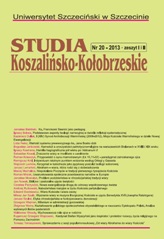Podstawowe aspekty teologii narracyjnej w świetle refleksji systematycznej
Basic aspects of narrative theology in the light of systematic reflection
Author(s): Ignacy BokwaSubject(s): Customs / Folklore, Biblical studies, Systematic Theology
Published by: Wydawnictwo Naukowe Uniwersytetu Szczecińskiego
Keywords: narrative theology; narrative structure of depth; biblical story; Christian tradition; dogma and symbol; theological self-consciousness;
Summary/Abstract: Basic aspects of Narrative Theology in the light of systematic reflection Narrative Theology is one of the most interesting phenomena in contemporary theology. This paper tries to indiacate the meaning of Narrative Theology for theological systematics.”Narrative theology’ derives its name from a Latin word narrare that means to tell. It is a modern attempt of renewal Christian theology as theology of historical religion, which not only conveys the message in the form of written fixed rules of faith, but also intends to tell about specific events. Liberating from the abstract doctrinal statements, narrative theology finds its spirtual homeland in the biblical and other religious stories. It prevents all attempts to separate theology from the life and the cult. However, it needs critical rules that enable setting the meaning and the truth. Precursors of Narrative Theology were two German theologians – Johann Baptist Metz and Harald Weinrich. Narrative theology draws attention to the fact that the representation of killed Jesus as a living Messiah for the particular human being or the specific human community can not appear on the basis of rational argument or historical documentation, as there is a problem of replacing the bridge between those historical events and the current situation. This can be done not by the forces of the intellect but rather with the use of all human powers, that is his feelings, imagination and fantasy. It will be a holistic approximation to the faith that is in the centre of the fundament. The standard approach to the Church is a treaty and theoretical one. Consequently, we need to develop such a symbolic and theoretical interpretation of the Christian tradition in which there is a place for narrative and correlative approach of the Church. In frames of the reference to the Christian tradition the complex of tradition connected to the definition of the Church takes a special place. A symbolic and telling approach to the Christian tradition opens perspectives that allow to look in a new way – from one’s own life perspective – at what makes Christianity, in order to join realization of being a Christian consciously. Narrative theology feels the spirit of the times perfectly. It rightly recognizes that time of passing the faith in a dry, dogmatic formulas has inevitably finished. Narrative Theology takes a bold attempt to encompass the whole of Christian message from the perspective of existential human experience. The result of this effort is attributed to the new structure of the Christian tradition. This is necessary to be able to speak of a new theology. Narrative Theology is by no means the finished project as it still requires the further clarification and expansion. For example, we need to consider the problem of the relationship between narrative structure, the depth of the JudeoChristian tradition and types of short stories, which we find in the biblical and theological texts. With its concept of an open storytelling, narrative theology raises an important question at the concept of closed revelation. Narrative theology can be understood as an opportunity to renew a still alive project of hermeneutic theology, which is theology interested in explaining, translating, making texts more understandable – in the sense of formulas and symbols of faith – theology, comprehending its essence as an art and science of explanation and interpretation of texts.
Journal: Studia Koszalińsko-Kołobrzeskie
- Issue Year: 2013
- Issue No: 20
- Page Range: 19-31
- Page Count: 13
- Language: Polish

